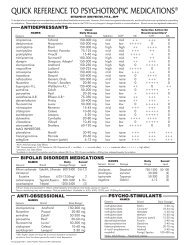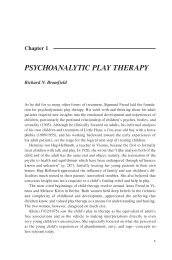IRAQ WAR CLINICIAN GUIDE
Iraq War Clinician's Guide - Network Of Care
Iraq War Clinician's Guide - Network Of Care
Create successful ePaper yourself
Turn your PDF publications into a flip-book with our unique Google optimized e-Paper software.
Iraq War Clinician Guide 63 Caringfor the Clinicians<br />
Burnout<br />
Taking care of trauma patients for long periods can take a toll on the staff, resulting in "burnout."<br />
Solite and Solite (2003) define burnout as "a state of physical, emotional, and mental exhaustion<br />
that results from intense involvement with people over long periods of time." Symptoms of burnout<br />
include feeling strained by having to work with people, increasing difficulty sustaining<br />
concentration and attention levels throughout prolonged periods of work, decreasing memory for<br />
work-related details, and reacting to challenges with increasing cognitive rigidity rather than with<br />
cognitive flexibility.<br />
Among physicians, surgeons may be at the greatest risk of burnout. In a recent study (Michigan<br />
Medicine, 2002) graduates of the University of Michigan surgical residency programs were asked<br />
to rate their level of burnout. One third of the respondents reported "emotional exhaustion"<br />
indicating that they "had nothing left to give" and one sixth reported "depersonalization," meaning<br />
they distanced themselves from the experience of taking care of patients. Nursing staff is a group<br />
that interacts with trauma patients around the clock and may be more vulnerable than other<br />
clinician groups.<br />
Strategies for Addressing Vicarious Traumatization at Burnout<br />
The Walter Reed Army Medical Center (WRAMC) Psychiatry Consultation Liaison Service (PCLS)<br />
focuses on the following methods for preventing burnout:<br />
managing relationships<br />
maintaining collaboration and collegiality at work and intimate connections at home<br />
making regular adjustments in one's lifestyle<br />
living in harmony with ones innermost values<br />
managing one's attitude<br />
developing philosophies that foster hope and reasonable optimism about one's future.<br />
A mental health consultant can facilitate the use of these methods. Tips for managing stress that<br />
can be shared with clinical staff include ensuring one's own safety, accepting support when<br />
offered, and making phone calls to speak with helpful family members or friends. These methods<br />
allow clinicians to distance themselves from the day-to-day emotionally taxing tasks of caring for<br />
trauma patients. Clinical staff should also be instructed to take time to seek enjoyment from<br />
outside activities; use deep breathing techniques, muscle contraction or other effective relaxation<br />
techniques; make good use of humor; avoid becoming absorbed in negative news; and use<br />
support services as available. Clinicians may also benefit by taking the opportunity to become<br />
more knowledgeable about other non-trauma care-related subjects, remembering to employ othe~<br />
previously successful coping styles, watching for signs of depression or anxiety in themselves and<br />
co-workers, and contacting local mental health resources for additional options, when necessary.<br />
WRAMC PCLS has developed ongoing programs to provide support to the hospital staff.<br />
Attendance at nursing morning reports and shift changes has allowed PCLS staff members to<br />
provide encouragement and education to the nursing staff. Support groups or venting sessions<br />
worked initially in the beginning of Operation Iraqi Freedom. As nurses became more clinically<br />
proficient and gained mastery, plans and protocols to take care of injured soldiers were developed<br />
DEPARTMENT OF VETERANS AFFAIRS<br />
NATIONAL CENTER FOR PTSD




